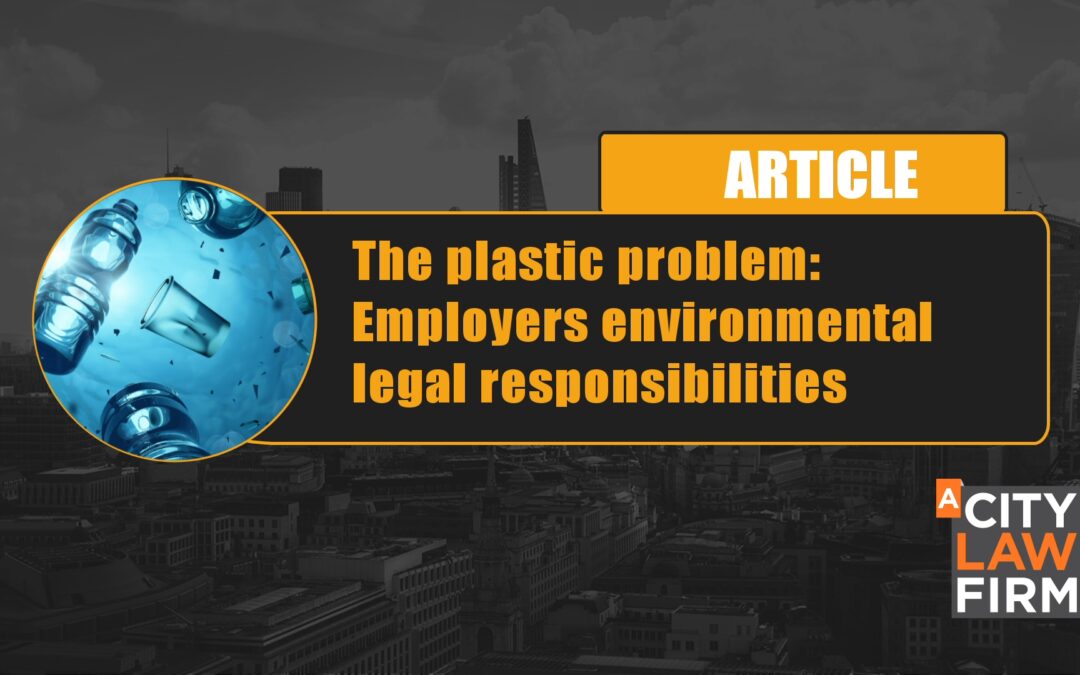CEO of A City Law Firm Karen Holden discusses UK plastic laws and what duties businesses have to the environment.
We produce about 300 million tonnes of plastic waste every year. Plastic pollution is a problem that continues to grow, resulting in significant ecosystem pollution, ecological, social, and economic harm. Although there is currently a push for a dedicated international legal framework to deal with plastic pollution, there is currently no international agreement that focuses primarily on combating plastic pollution.
UK plastic laws
The EU introduced the Single Use Plastics Directive in December of 2019 banning several single use items. The Directive will not be brought into UK law, but the nations of the UK are each taking a different approach and banning specific items. England for example will not be banning cutlery and plates but Wales will. England however is planning to reduce its single use plastic consumption through other policies like the Waste and Resources Strategy. That 2018 strategy aims to oblige retailers and producers to pay for the cost of collection and recycling, which is currently 90% paid for by the taxpayer.
As part of a wider strategy to increase recycling, primary legislation for a Plastic Packaging Tax is currently before Parliament. When this is finalised (proposed to be April 2022) it will encourage the use of recycled rather than new plastic within plastic packaging by taxing plastic packaging which is manufactured in or imported into the UK containing less than 30% recycled content.
Business benefits for reducing plastics
Apart from the legislative and regulatory framework above, businesses in the UK should look to have a policy on their plastic use and other environmental impacts in the workplace for many reasons other than just for the environment. As impetus grows for change, the reasons for businesses to be greener have multiplied, including Attracting and keeping customers, reducing outgoings, retaining and attracting the best staff, reputation, with potential opportunities for PR and reducing the risk of litigation. There is a real possibility that in the future, businesses with an extreme level of plastic output, could be at risk of litigation. This could include personal liability for the Directors through breaches of their duties.
Directors’ duties
Duties Directors have under UK law regarding material business risk and plastic pollution:
- The duty to promote the success of the company under s.172 of the Companies Act 2006. The relevant factors here include the long-term impact of the Directors decisions, impact on the environment, reputation, relationships with clients and suppliers, which would all be affected by significant plastic creation.
- The duty to exercise reasonable care, skill and diligence under s.174 of the Companies Act 2006. This section includes the knowledge ‘that may reasonably be expected of a person carrying out that director’s role. We could assume that the standard required of Directors is constantly evolving in relation to what that director should know about their business. This will probably include new research into plastic pollution and risk where plastic and plastic pollution to be a significant part of the business.
- The duties of disclosure under s.414A of the Companies Act 2006: Companies that are not considered small companies are required to publish an annual strategic report. Considering this must cover the principal risks and uncertainties of the company, it is likely to contain environmental matters, and for intensive plastic users or producers, it should cover plastic pollution.
What changes can be made?
For big business the changes are likely to be sector specific. For small business, there are a number of changes that can assist in reducing plastic use to lead to some of the benefits in reputation, cost savings, and for the environment:
Carry out an audit on your plastic use: Once you have the results, make a note of all the things that can be reduced.
Engage with your employees: Whether or not your employees are on board will affect how successful your attempts are to reduce your plastic output. Gain their input on how reductions could be made in their role.
Review tea and coffee use: Tea and coffee packaging, including tea bags, often contain plastic. An alternative to avoid plastic in milk is milk delivery in bottles.
Ban plastic bottles: Adding a water filter to the tap or investing in a water cooler will resolve the need for plastic bottles.
Use more recycled content: Using recycled plastic in any products your business requires that must be plastic, will increase the demand for recycled plastic production.
Have a policy: Have a policy on plastic use drafted for your business. This will allow new employees to see how the business is a sustainably responsible one and for current employees to know what changes are required. Gaining employee input will be the most significant step in getting your plastics policy to work for you.

